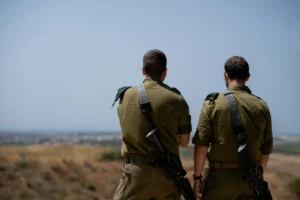From Britain to Gaza.. The Journey of Saad Al-Maghribi on the Flotilla of Solidarity

In an exclusive interview with Arab in UK (AUK), Libyan academic Dr Saad Al-Maghribi, who has lived in Britain for over two decades, shared the untold story behind his participation in the Flotilla of Solidarity — an international initiative launched in a symbolic effort to break the blockade imposed on Gaza.
Dr Al-Maghribi joined the Omar Al-Mukhtar, one of six ships that set sail from European ports carrying activists from more than 30 countries, along with humanitarian aid. It was a journey where danger met determination, and where every moment at sea reflected the shared human spirit of those united by one purpose — ending Gaza’s illegal siege and blockade.
“A moral duty before a personal decision”
“I came to Britain more than 25 years ago, and solidarity with Palestine has always been at the heart of my activities,” said Dr Al-Maghribi. “I never imagined that one day I would find myself aboard a ship sailing towards Gaza.”
He explained that his participation came after years of human rights work and solidarity efforts for the Palestinian cause. Joining the flotilla, he said, was “a moral duty before being a personal choice.”
Preparing for the voyage

Before the ships set sail, participants received training on how to respond to emergencies at sea. Although the mission was largely symbolic, everyone on board understood the risks — from close surveillance to possible interception by Israeli forces.
“The preparations were full of enthusiasm but also a natural sense of apprehension,” recalled Dr Al-Maghribi. “We knew this wouldn’t be an easy journey, but it was one driven by conscience before anything else.”
The Omar Al-Mukhtar departed from Libya, carrying activists from the Arab world and Europe, as well as humanitarian supplies.
“When I decided to go, I was fully aware of the dangers,” he said. “But I also knew I was part of something greater — a message of solidarity and humanity that transcends borders.”
The voyage presented its own challenges: maintaining the ship, coordinating teams, and managing resources. Yet, the sense of unity and shared purpose among those on board kept morale high despite the difficulties.
Confrontation at sea

As the flotilla approached Palestinian waters, the crew faced their first major test.
“We saw the Israeli boats racing towards us and heard soldiers shouting through loudspeakers,” said Dr Al-Maghribi. “Moments later, the attack began. The ships were seized violently, and we were all restrained.”
Dr Al-Maghribi and dozens of other activists were taken to Ashdod Port, where they were interrogated, denied communication with their families, and forced to sit on the ground for long hours.
“The treatment was harsh,” he said. “Some of us were not allowed to eat or contact a lawyer for days. The most painful part was the feeling of helplessness — being unable to complete the mission we started for the people of Gaza.”
Despite the ordeal, Al-Maghribi spoke of remarkable solidarity among detainees from different nationalities, who supported one another through the difficult days. He spent six days in Israel’s notorious Ketziot Prison, which he described as “gruelling but eye-opening.”
After several days of detention, the activists were released and deported via Jordan to their home countries — marking the end of what Al-Maghribi called “a tough but meaningful journey.”
“The return wasn’t a moment of celebration,” he said. “It was a moment of reflection — a hope that our message had reached the world: breaking the blockade is not only about borders and ports, but about awakening a global conscience.”
British authorities did not take any legal action against him, and he received widespread moral support from those who followed his story.
Justice requires action, not words
Reflecting on the experience, Dr Al-Maghribi said:
“Even if we didn’t reach Gaza, we made its voice heard around the world. This journey wasn’t a failure — it was a reminder that justice needs people who act for it, not just talk about it. The struggle is not only against the occupier, but also against the silence and complicity of those who choose to look away.”
Dr Saad Al-Maghribi’s experience aboard the Omar Al-Mukhtar embodies the essence of human solidarity — from lecture halls to open seas, and from teaching to hands-on activism. His story stands as a powerful reminder that solidarity is not a slogan, but a commitment to justice and humanity.
Read More:
ShortURL ⬇

